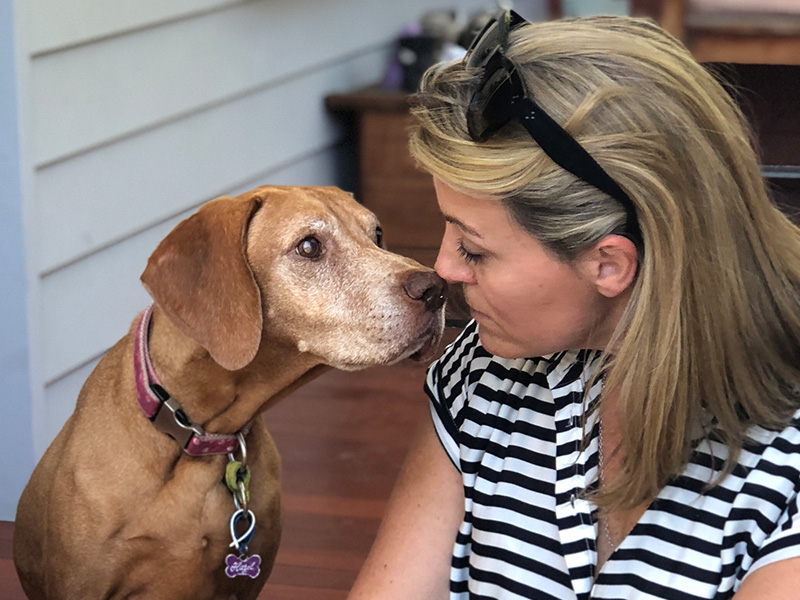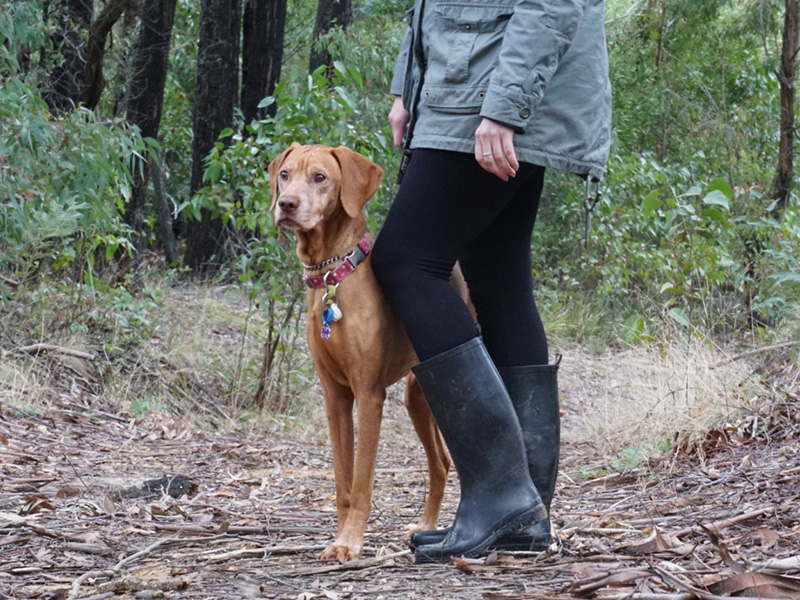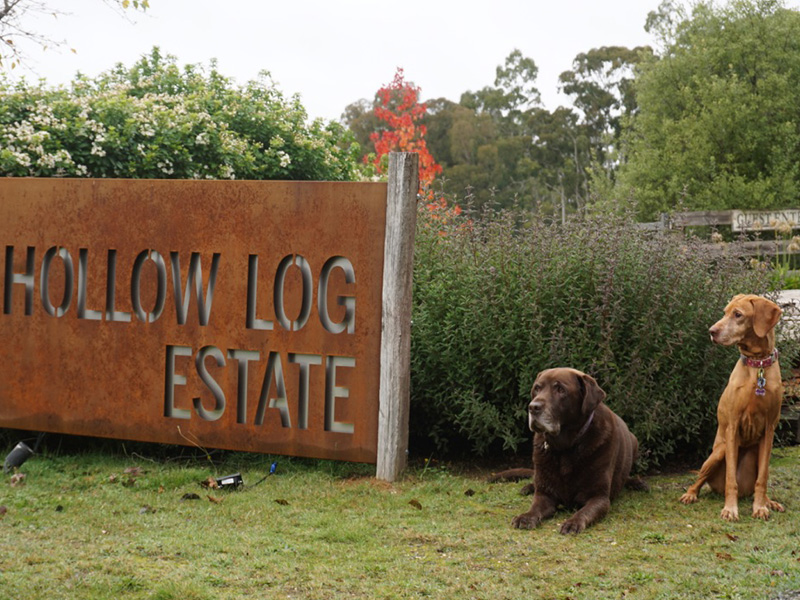Meet Hazel, a 10-year-old Hungarian Viszla who lives in Melbourne with ‘Mum’ and Holidaying with Dogs owner, Penny. Hazel likes sunbathing, snuggling under the blankets, chewing tennis balls and tummy scratches. On any given day you’ll find her stretched out in any patch of sunlight she can find.
Hazel is also blind but this wasn’t always the case.
“One day I was walking Hazel and throwing a ball for her like I’d done hundreds of times before. But this time was different.” Penny explains “Unless I threw the ball so it bounced directly in front of her face, she couldn’t find it. Then I started to notice other changes too. She had been a master at catching tossed treats, but they kept hitting her in the face. Then, she began to bump into the furniture.”
“All of this happened within a period of 2 weeks. She was 6 years old at the time and in good health so I didn’t even consider blindness. But, after numerous eye exams, blood tests, MRIs and retinal scans, the diagnosis was confirmed. She had SARDS (Sudden Acquired Retinal Degeneration) and would rapidly and permanently lose her eyesight.”
Within two months Hazel was completely blind and after the initial shock of the diagnosis, Penny began making the adjustments needed for life with a blind dog.
“When Hazel first went blind we had to make some changes” says Penny. “The Vet suggested that we keep the floor clear of objects that may be a tripping hazard and to avoid moving furniture around.”

Adapting to life with a blind dog
Penny has made a number of changes around the home and in the way she communicates with Hazel. These include:
Creating a “map” by marking locations around the house with different scents and/or textures:
- Fragrant plants are great to flag the tops and bottoms of stairs
- Essential oils are great for marking doorways, sharp corners and some furniture – Vicks (used sparingly) is also useful to highlight dangerous objects
- Rugs and mats to create different zones. Penny uses a mat for Hazel’s food/drink bowls and the hallway runner gives her some orientation too
Switching from visual to auditory training commands: Penny used to point to the ground for Hazel to drop but now has to tap the ground as she says “drop”. She also adapted existing commands to warn of obstacles. Penny says:
- I tell her to “step up” or “step down” as we’re approaching the curb or a step so she knows to raise her foot a bit higher or lower
- I tell her “careful” if she’s approaching an obstacle and needs to be aware
- I yell “STOP!” if she’s moving too fast and about to collide with something
Sing while you walk! You don’t actually have to sing, Penny admits, but it is helpful to make some sound when walking so your dog knows where you are at all times. “I started with bells on my shoes but I use a range of tools now; the flip, flop of thongs is actually pretty good, jingling keys or simply talking to her and tapping my legs as we walk helps.”
Use caution with new dogs. Hazel has trouble distinguishing exuberance in other dogs with aggression, so Penny keeps her on lead when meeting new dogs. She says “once she’s familiar with a dog she will mostly ignore them, unless they’re trying to steal a pat from me!”.
These days, aside from avoiding large crowds, life with a blind pet is much like any other.

Moving house with a blind dog
“Recently we moved house” Penny explains “this required some forethought and planning to help Hazel adapt quickly to her new surroundings”. The scent and texture map is key for a new abode but depending on the size of your property, other things can be useful too:
- Stones at the edge of the property – so Hazel could feel the different texture with her paws and use that to navigate her way around the yard and back to the house
- Wind chimes also work well for this purpose – providing auditory markers for key areas of your house and property
Taking a blind dog on holiday
In her role as co-owner of Holidaying with Dogs, Penny takes Hazel away on holidays with her regularly.
- A dog’s primary sense is smell so use this to your advantage. Upon arriving in a new location, sweep your dog’s blanket around all corners of the house – to help them orientate themselves
- Bring your dog’s food mat and bowls so they can easily locate drinking water
- Smell is also useful to highlight any hazards. Use strong smelling Vicks or other essential oils on sharp corners and potential hazards that your pet could walk into
- When booking holiday accommodation, avoid properties with stairs. Select a property that is fenced. That way, if your pet becomes scared, they cannot run away and hurt themselves or get lost
- Warn others that your dog is blind so that they can take care when approaching and greeting your pet. There are a number of leashes, harnesses and bandanas available these days that can be used to highlight your dog’s blind status to others
- The same applies for other dogs, who may not be happy with an (unintended) invasion of their space. Ideally, allow the blind dog to make the first approach with new people or pets
“Above all, it’s about having fun with your pet.” says Penny “Despite being unable to see, Hazel loves exploring new places and enjoys a good beach run, just like any other dog.”

Do you have a blind dog? We would love to hear your tips for keeping them safe and happy whilst on holiday. Comment below.
You may also enjoy reading Holidaying with your dog that includes a handy packing checklist for your pets.
START SEARCHING FOR YOUR HOLIDAY >>



Our dog has gone blind due to cataracts and age. We too use floor textures and mats, and to a lesser degree scent – the back door has mint, the front door roses, keeping deodorants & perfumes in the bathroom and of course there’s the usual kitchen smells. We travel in our caravan, so he always has his own space wherever he goes. He has a long lead while at the van, that allows him full access to the van and outside annex space. He also has a bed & water in the car, so if he needs to be left for a short period in the cooler months, always in the shade with windows open, he is comfortable , but this is a rare event. Our challenge now is if he has to be boarded, again a rare event. Many places are reluctant to take on an older dog with a disability. His adventures are gentler & quieter these days, but he loves his holidays!
Hi Sue,
Thanks for commenting. Your long lead for the van is a great idea – I haven’t needed that yet but I’ll keep it in mind.
I know what you mean about the boarding issue – even if a kennel didn’t have a problem with her blindness, she gets too stressed with unfamiliar dogs so I just don’t do it any more.
Luckily she can come most places with me, which is great for both of us!
Thanks again for your interest and all the best for the fun and adventure of living with a blind dog!
Our beautiful rescue dog, Benji, went blind basically overnight with SARDS. That was nearly 5 years ago when he was about 10. We took him to a doggie eye specialist but there was nothing to be done. Benji was quite depressed for several months as he did not know what was happening to him but gradually he adjusted. He has our house mapped out in his memory and also adjusts quickly to our holiday house which we visit regularly. We do not leave shoes or anything lying around that he can trip over but he can get confused if he gets stuck for instance under the dining room table and keeps bumping into chair legs. Benji used to just love to run but after a few dreadful bumps in the park and on the beach he doesn’t do this anymore. We now keep him on a long leash when on the beach which is much better for him.
We got Benji from the local pound when he was about 3 years old. He had been badly treated before winding up in the pound and it took a long time for him to feel comfortable and safe in our house. Even now, after 13 years with us, he will hide in the corner shaking if a stranger comes to our house. We feel that contracting SARDS has been a double blow for him.
We have another rescue dog, Lachie, and everyone said that he would help his ‘brother’ when he went blind. This hasn’t happened but we do sometimes watch as Lachie sits on the lounge obviously watching Benji as he wanders around looking for Lachie.
Like your dog, Benji has learnt new instrctions and he know that step means he needs to go up a gutter or stairs.
Benji is such a lovely dog. He is currently lying next to me on the lounge fast asleep cuddled up to his fluffy giraffe shaped pillow.
Him going blind was such a terrible blow for all of us but we are amazed at how he adapted.
Hi Julie,
Thanks so much for sharing about Benji – he is very lucky to be a part of your household!
It can be very stressful with a blind dog and while I don’t think she’s suffered the depression that Benji did, she’s certainly not as confident as she used to be and doesn’t like to meet new dogs at all. Once she’s familiar with a dog she mostly ignores them, but there’s not the time to go through the ‘getting to know you’ process on a regular walk, so I’m afraid she’s stuck with my company. I think she might prefer it that way – she thinks she’s a human!
Like Benji, she knows the layout of our place inside and out and seems to have a system of mapping a new location by spending the first few hours “counting” her steps between different points. I think it’s amazing how adaptable they are too and sometimes have to remind myself that she’s blind at all given how well she moves around.
Thanks again for your interest and all the best with Benji!
Our dog started to go blind with cataracts. He started bumping into everything, falling down gutters and walking into street signs. We had to keep him on a very short lead for walks in our inner city suburb. He was fine in the wide open spaces of parks but always got a big shock when another dog approached him and he couldn’t tell how big they were and whether they were aggressive. We used the words hup and down to get him up and down the sidewalks. He was about 7 when this started.
We had the operation to get the cataracts removed. About 8 grand so quite expensive but totally worth every cent. He was like a new dog and back to puppy like behaviour running around like a mad thing. He adapted quite well while blind but it was still quite difficult while he adjusted to not seeing but now he can see again it really is so much better. It’s a lot of money and the recovery is also quite difficult, especially in the first month as there is so much care and eye drops required. Even two and a half years later he still has a number of daily eye drops to be administered but at least it’s not every 6 hours anymore. He’s 9 and a half now and happy as Larry. Definitely worth the investment of the cataract surgery.
Hi Kris,
Thanks for commenting about your experience. I agree that the adjustment period is quite difficult, but it seems a distant memory now and I almost forget she’s blind sometimes. And then she bumps into something to remind me!
It’s great news that you were able to recover his vision with surgery. I would definitely give that a go if it was an option.
All the best with your happy 9 year old!
Penny
My dog had been blind since 12months old (another dog took them when playing). She comes with me most places. Dallas is now
10 years old comes paddle boarding with
Me, she has a life jacket and is tied to the board . As long as she is on lead in a strange place she is just fine, people often don’t believe she is blind and have to feel her face (she has no eyes at all. As long as she can hear me or smell me she is great and enjoys life. People say she’s always smiling
Hi Debbie,
Thanks for sharing your story about Dallas. It doesn’t sound like being blind has held her back in any way – Hazel didn’t nail paddle boarding but she would go swimming as long as I was with her!
Keep smiling Dallas!
Penny
Hi my dog Lucy is a whippet was also diagnosed with SARD in January, we are still learning, she has a brother also but he is ok, they are both 10 years old. Lucy was always the healthy one. I take them for walks and try to build up her confidence, she walks into things at home still. My dogs are kept outside and she is mapping out her area, I try not to change too much, she has become very distant with me though, the other day I took both of them to my mums place which she knows very well , when I took them home after two days, she baulked and refused to go through the front door, I would say it was because she was confused, but I thought going from my mums place and mine.
I’m really sorry to hear about Lucy’s diagnosis. It takes a bit for both you and Lucy to get used to the new situation but it sounds like you’re doing the right things with maintaining walks and keeping her area as consistent as possible.
Interesting that she was reluctant to go through your front door after being at your mum’s place and you’re probably right about her being confused. One thing I always did when we went between places was to take her unwashed blankets and drag them around the house so her smell would be there and she would sense something familiar. If you placed them in the entry to your front door it would be the first thing she smells and might put her at ease.
It will be a bit of trial and error because Lucy is learning how to cope with the situation too and may not fully trust her other senses yet. You’re on the right track and just remember to be patient with her.
All the best,
Penny (Hazel’s Mum)